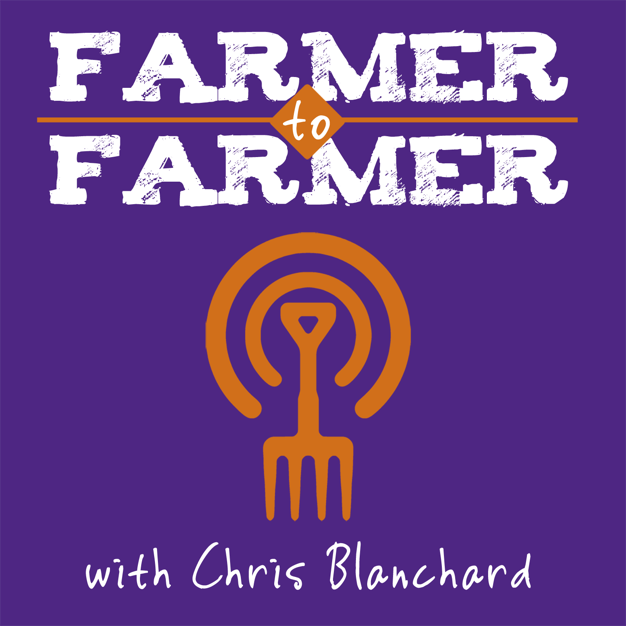
Farmer to Farmer with Chris Blanchard
Chris Blanchard
The organic and sustainable farming movement has its roots in sharing information about production techniques, marketing, and the rewards and challenges of the farming life. Join veteran farmer, consultant, and farm educator Chris Blanchard for down-to-earth conversations with experienced farmers - and the occasional non-farmer - about everything from soil fertility and record-keeping to getting your crops to market without making yourself crazy.
- 1 hour 10 minutes176: Jan Libbey of One Step at a Time Gardens on Scaling Up, Scaling Down, and Partnerships and Networking
Jan Libbey raises three acres of vegetables with her husband, Tim Landgraf, at One Step at a Time Gardens in North Central Iowa. With sales through their CSA and the North Iowa Fresh Food Hub, the market farm makes up one of multiple streams of income that include cash rent and CRP income on their 132 acre farm.
We dig into how Jan and Tim have made One Step at a Time Gardens work in rural Iowa, with an emphasis on their marketing efforts. Jan shares the story of growing the market farm operation, and then choosing to shrink it again as the business matured. We discuss how they’ve chosen their investments on the farm so that they are mechanizing where it counts.
We take a deep dive into their carrot production and the crop rotation they follow on their hilly farm, as well as the landscape and habitat restoration efforts Tim and Jan have made over the years and how those fit into the life and economy of the farm.
Perennial support for the Farmer to Farmer Podcast is generously provided by Vermont Compost Company.
Pictures, show links, and more at farmertofarmerpodcast.com/episodes/libbey.
30 August 2018, 8:30 am - 176: Jan Libbey of One Step at a Time Gardens on Scaling Up, Scaling Down, and Partnerships and Networking
Jan Libbey raises three acres of vegetables with her husband, Tim Landgraf, at One Step at a Time Gardens in North Central Iowa. With sales through their CSA and the North Iowa Fresh Food Hub, the market farm makes up one of multiple streams of income that include cash rent and CRP income on their 132 acre farm.
We dig into how Jan and Tim have made One Step at a Time Gardens work in rural Iowa, with an emphasis on their marketing efforts. Jan shares the story of growing the market farm operation, and then choosing to shrink it again as the business matured. We discuss how they’ve chosen their investments on the farm so that they are mechanizing where it counts.
We take a deep dive into their carrot production and the crop rotation they follow on their hilly farm, as well as the landscape and habitat restoration efforts Tim and Jan have made over the years and how those fit into the life and economy of the farm.
Perennial support for the Farmer to Farmer Podcast is generously provided by Vermont Compost Company.
Pictures, show links, and more at farmertofarmerpodcast.com/episodes/libbey.
30 August 2018, 8:30 am - 176: Jan Libbey of One Step at a Time Gardens on Scaling Up, Scaling Down, and Partnerships and Networking
Jan Libbey raises three acres of vegetables with her husband, Tim Landgraf, at One Step at a Time Gardens in North Central Iowa. With sales through their CSA and the North Iowa Fresh Food Hub, the market farm makes up one of multiple streams of income that include cash rent and CRP income on their 132 acre farm.
We dig into how Jan and Tim have made One Step at a Time Gardens work in rural Iowa, with an emphasis on their marketing efforts. Jan shares the story of growing the market farm operation, and then choosing to shrink it again as the business matured. We discuss how they’ve chosen their investments on the farm so that they are mechanizing where it counts.
We take a deep dive into their carrot production and the crop rotation they follow on their hilly farm, as well as the landscape and habitat restoration efforts Tim and Jan have made over the years and how those fit into the life and economy of the farm.
Perennial support for the Farmer to Farmer Podcast is generously provided by Vermont Compost Company.
Pictures, show links, and more at farmertofarmerpodcast.com/episodes/libbey.
30 August 2018, 8:30 am - 176: Jan Libbey of One Step at a Time Gardens on Scaling Up, Scaling Down, and Partnerships and Networking
Jan Libbey raises three acres of vegetables with her husband, Tim Landgraf, at One Step at a Time Gardens in North Central Iowa. With sales through their CSA and the North Iowa Fresh Food Hub, the market farm makes up one of multiple streams of income that include cash rent and CRP income on their 132 acre farm.
We dig into how Jan and Tim have made One Step at a Time Gardens work in rural Iowa, with an emphasis on their marketing efforts. Jan shares the story of growing the market farm operation, and then choosing to shrink it again as the business matured. We discuss how they’ve chosen their investments on the farm so that they are mechanizing where it counts.
We take a deep dive into their carrot production and the crop rotation they follow on their hilly farm, as well as the landscape and habitat restoration efforts Tim and Jan have made over the years and how those fit into the life and economy of the farm.
Perennial support for the Farmer to Farmer Podcast is generously provided by Vermont Compost Company.
Pictures, show links, and more at farmertofarmerpodcast.com/episodes/libbey.
30 August 2018, 8:30 am - 57 minutes 28 seconds175: Lauren Palmer of Bloomsbury Farm on Sprouts, CSA, and Community Connections
Lauren Palmer raised 15 acres of vegetables in Smyrna, Tennessee, just south of Nashville. With year-round production, a sprouts operation, a 300-member CSA, wholesale accounts, farmers markets, and on-farm events, Bloomsbury Farm is a thriving hot spot in the local food scene in Nashville.
We dig into how Lauren has built the farm from the ground up since its start in 2009, taking a deep dive into Bloomsbury’s sprout production, employment structures, and CSA setup. We discuss how she deals with extreme deer pressure and regulations, and how she navigated a farm divorce. And Lauren reflects on the value of four-season production and building relationships with her customers and community.
Perennial support for the Farmer to Farmer Podcast is generously provided by Vermont Compost Company.
Pictures, show links, and more at farmertofarmerpodcast.com/episodes/palmer.
23 August 2018, 8:30 am - 1 hour 14 minutes174: Jack Algiere of the Stone Barns Center on a Diversified Farm, a Close Partnership with a Restaurant, and Innovative Production
Jack Algiere is the farm director for Stone Barns Center in the New York’s lower Hudson Valley. Actively farming since the early 1990s, Jack has been the director at Stone Barns since its inception fifteen years ago. Jack oversees the extensive and diversified farm operations, including indoor and outdoor vegetable production, small grains, and a diverse array of livestock.
Most of the farm’s produce and meat is sold to the partner restaurant Blue Hill, and we dig into how this relationship has benefitted both the farm and the restaurant. We also take a look at how the vegetables are integrated into the livestock and pasture operation, the half-acre gutter connect greenhouse and how that differs from high tunnel production, and the compost heating system for the propagation operation.
Perennial support for the Farmer to Farmer Podcast is generously provided by Vermont Compost Company.
Pictures, show links, and more at farmertofarmerpodcast.com/episodes/algiere.
16 August 2018, 8:30 am - 1 hour 15 minutes173: Jean-Martin Fortier of La Ferme de Quatre Temps on Intensive Production on More Acres
Jean-Martin Fortier is most famous for his book, “The Market Gardener,” based on the high-output systems he developed at Quebec’s Les Jardens de la Grelinette, where his wife, Maude Helen, currently produces over $150,000 of produce on an acre and a half of production ground. He currently farms at La Ferme de Quatre Temps, an enlarged version of the same model on six acres of production ground.
We dig into the foundations of JM’s production model, from high fertility to an emphasis on weed prevention, and how that model has translated to more acres on his new project. JM reflects on the changed constraints with his new farm, and we discuss the lessons that JM has learned about personnel with a much larger crew and a different role for himself.
Perennial support for the Farmer to Farmer Podcast is generously provided by Vermont Compost Company.
Pictures, show links, and more at farmertofarmerpodcast.com/episodes/jmf.
9 August 2018, 8:30 am - 1 hour 17 minutes172: Allan Gandelman of Main Street Farms on Meeting People’s Needs through Scaling and Marketing Decisions
Allan Gandelman raises 45 acres of crops at Main Street Farms in central New York state with his partner, BobCat. With twenty employees in its eighth year in business, Main Street Farms sells through a CSA, farmers market, and wholesale accounts.
Main Street Farms got its start in 2011 with an acre of production and an aquaponics set up, so they’ve grown a lot in the last eight years and Allan and I talk a lot about the process of scaling up their operation and finding their way with different mixes of enterprises and marketing outlets, and how that has meshed with meeting the needs of people on the farm.
We dig into Main Street Farms’ 42-week CSA, their acre of greenhouse production, and their new hemp enterprise and how it all fits together into a coherent whole.
Perennial support for the Farmer to Farmer Podcast is generously provided by Vermont Compost Company.
Pictures, show links, and more at farmertofarmerpodcast.com/episodes/gandelman.
2 August 2018, 8:30 am - 1 hour 20 minutes171: Caroline Pam and Tim Wilcox of Kitchen Garden Farm on Scaling Up, Value-Added Products, and Wholesale Marketing
Caroline Pam and Tim Wilcox farm 50 acres of vegetables at Kitchen Garden Farm in Western Massachusetts. Starting with an acre of produce in 2006, Caroline and Tim have steadily expanded the farm’s scale and added fire-roasted salsa and a naturally fermented sriracha to their farm’s production.
We discuss the value-added products and how those fit into the work and overall business of Kitchen Garden Farm, since they account for a significant portion of the farm’s revenue. Tim and Caroline dig into the process of scaling up their operation, including how they manage a multitude of different locations for production. And Caroline and Tim share how they’ve developed a wholesale-only marketing strategy, and the nuts and bolts of how that works on their farm.
Perennial support for the Farmer to Farmer Podcast is generously provided by Vermont Compost Company.
Pictures, show links, and more at farmertofarmerpodcast.com/episodes/kitchengarden.
26 July 2018, 8:30 am - 1 hour 11 minutes170: Rebecca Graff and Tom Ruggieri of Fair Share Farm on CSA Transitions, Greening the Farm, and a Fermented Food Business
Rebecca Graff and Tom Ruggieri raise vegetables for a hundred-member CSA, manage a small laying flock, and operate a cottage-scale fermented food business at Fair Share Farm, 45 minutes north of Kansas City, Missouri. They’ve been farming together on family land since 2004 after meeting in the fields at Peacework Organic Farm in upstate New York.
We dig into the nitty gritty of their member-oriented CSA program, and the changes its undergone in the last couple of years as Rebecca and Tom have looked to change the farm’s economic basis and their quality of life. Tom and Rebecca share how they’ve changed their sign-up process and work requirement as their CSA goes through transitions.
We also take a hard look at their fermented foods production and how that fits in with their vision for the farm and the CSA model, as well as the efforts they’ve made to reduce the overall ecological footprint of the farm with a solar greenhouse, an electric tractor, and a vigorous cover crop and soil building effort.
Perennial support for the Farmer to Farmer Podcast is generously provided by Vermont Compost Company.
Pictures, show links, and more at farmertofarmerpodcast.com/episodes/fairshare.
19 July 2018, 8:30 am - 1 hour 28 minutes169: Nate Fingerle of River Ridge Farm on Four Seasons of Fresh Vegetables in Rural Indiana
Nate Fingerle has been farming with his family at River Ridge Farm in north-central Indiana for ten years. With one-and-a-half acres of production and ten thousand square feet of high tunnels, River Ridge provides vegetables to its customers year-round.
River Ridge has found success in a rural agricultural community with a combination of farmers markets, an on-farm retail store, and restaurant sales. We dig into how Nate and his family make this all work, and some of the details of how a lot of hustle has helped to cobble together a successful business in an unlikely marketplace.
Nate also shares his straightforward production techniques, including field work, fertility planning, transplant production, irrigation, weed control, and how he make season extension really pay in the high tunnels and out.
Perennial support for the Farmer to Farmer Podcast is generously provided by Vermont Compost Company.
Pictures, show links, and more at farmertofarmerpodcast.com/episodes/fingerle.
12 July 2018, 8:30 am - More Episodes? Get the App
Your feedback is valuable to us. Should you encounter any bugs, glitches, lack of functionality or other problems, please email us on [email protected] or join Moon.FM Telegram Group where you can talk directly to the dev team who are happy to answer any queries.
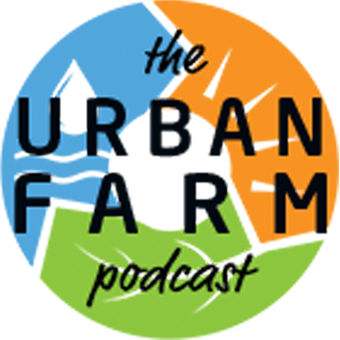 The Urban Farm Podcast with Greg Peterson
The Urban Farm Podcast with Greg Peterson
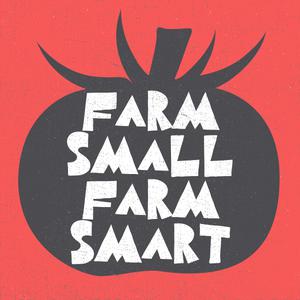 Farm Small Farm Smart
Farm Small Farm Smart
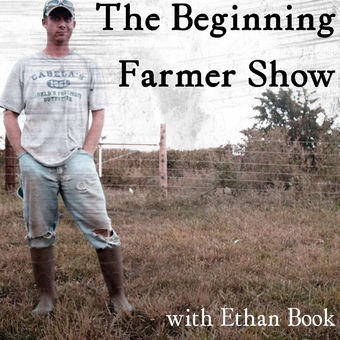 The Beginning Farmer Show
The Beginning Farmer Show
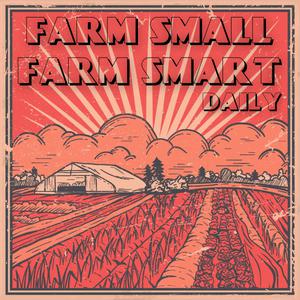 Farm Small Farm Smart Daily
Farm Small Farm Smart Daily
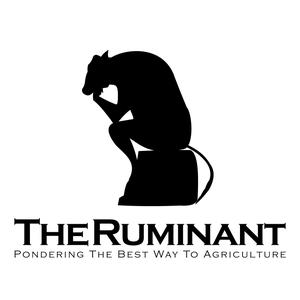 The Ruminant: Audio Candy for Farmers, Gardeners and Food Lovers
The Ruminant: Audio Candy for Farmers, Gardeners and Food Lovers
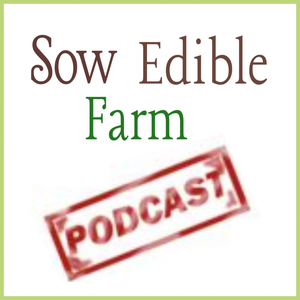 Sow Edible Podcast
Sow Edible Podcast